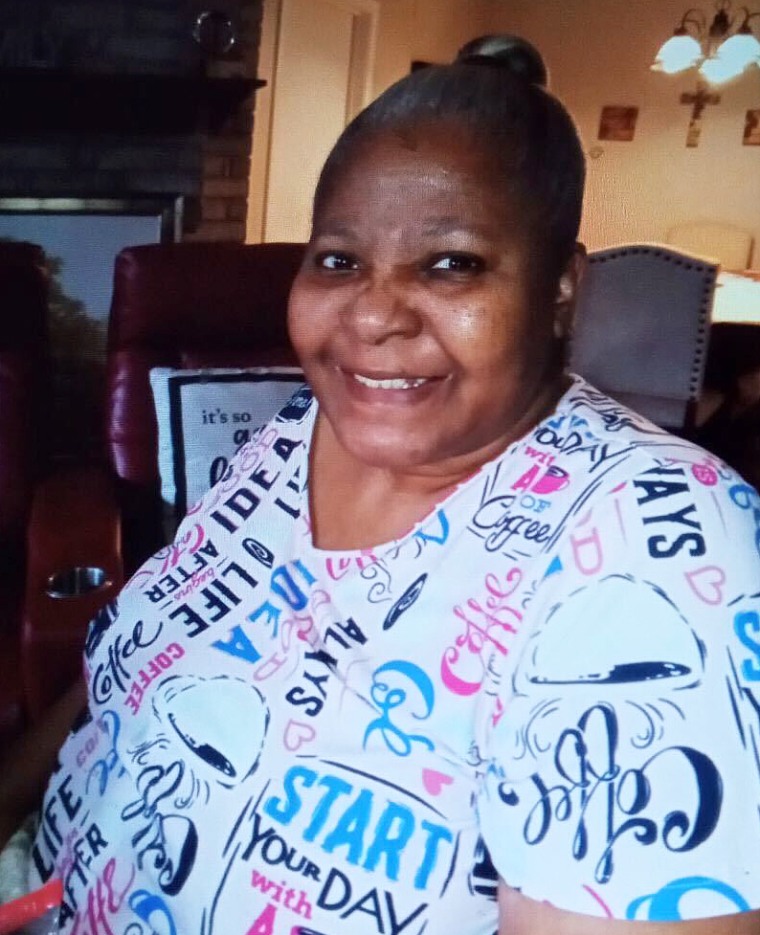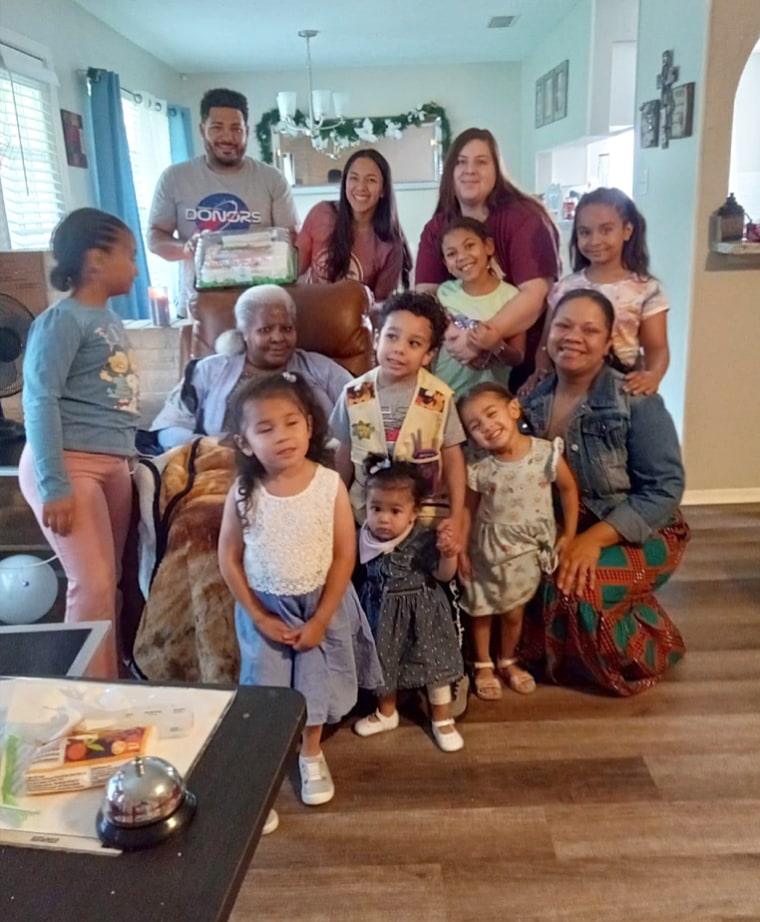Two days after Hurricane Beryl slammed into Texas, Janet and Pamela Jarrett still had no power in the Houston home the sisters shared. A heat advisory was in effect.
They passed the evening playing Pamela’s favorite game, Connect 4. All seemed well enough.
But early the next morning, Janet found Pamela, 64, who was disabled and used a wheelchair, struggling to breathe.
“I heard her heavy breathing, gasping for air,” Janet said. “That’s something that doesn’t leave your mind. It doesn’t go away. Even when I go to sleep and I’m laying there, I hear it. It’s like I’m living it all over again.”

Pamela died on the way to the hospital on July 11. Her official cause of death: hyperthermia due to environmental heat exposure.
The same cause of death is listed for one-third of the 21 confirmed deaths in Texas caused by Hurricane Beryl, meaning they happened not because of the typical threats a storm brings — flooding or falling trees — but instead as a result of severe heat amid the widespread power outages during and after the storm. Heat indexes, or the “feels like” temperatures, soared into the triple digits in the days after the storm.
The tragedies bring into focus how ill-equipped Texas (along with many other parts of the country) is for extreme weather events that are becoming more frequent and intense because of climate change — particularly when multiple disasters collide. The deaths also show how the line between one type of fatal environmental disaster and another can easily become blurred.
The death toll from Beryl in Texas is likely to continue climbing, and the heat fatalities are intensifying scrutiny of local utility company CenterPoint Energy and state leaders.
“She didn’t have to die that way,” Janet said of her sister. “I’m angry because I couldn’t get a response. I couldn’t call anybody. I’m angry at CenterPoint for not doing a better job. I’m just angry at everything.”
More than 2 million homes and businesses were affected by the outages caused by Hurricane Beryl, which made landfall as a Category 1 storm. In a statement to NBC News, CenterPoint said it intends to do a “thorough review” of its response to the storm.
“We want to express our condolences to the family and friends of those whose lives were lost as a result of Hurricane Beryl,” the utility said.
CenterPoint officials have maintained that the company mobilized crews as soon as it could and worked hard to address the outages.
Janet Jarrett endured nine days without power in total, during which she said temperatures indoors were almost 100 degrees Fahrenheit, even at night. She spent a week in that heat after her sister was gone.

Janet said she had done her best to keep Pamela cool by using cold rags and wheeling her outside when there was a breeze. But, as with most victims of heat-related illness, the symptoms weren’t obvious until it was too late.
“I didn’t even know that anything was really wrong with her,” Jarrett said. “It wasn’t something I could detect because she was talking and she was responding to everything and being her usual self.”
Jesus Rodriguez, a 52-year-old Houston resident, similarly had no idea that something was wrong with his 78-year-old father, Oscar. On July 10, their third day without power, Jesus said he checked on Oscar in the morning, bringing him water and a cold Diet Coke from a cooler.
When Jesus returned in the afternoon, his father “was lying back, kind of like he was asleep, but breathing hard,” Jesus said. “I almost didn’t think anything of it, but when I tried to wake him up, he didn’t wake up. That’s when I called 9-1-1.”
Oscar died that day at Houston’s Memorial Hermann Greater Heights Hospital. Jesus described his father as a devoted family man who was healthy for his age.
Their power had gotten knocked out during previous storms, but never for more than a couple days.
“This was most definitely the worst,” Jesus said. “It was almost a week-and-a-half before I got power back.”
He blamed CenterPoint for being slow to respond and for failing to communicate sufficiently.
“If they had said, ‘We aren’t getting to your house in a week and a half,’ maybe I would have been able to get my dad to go somewhere else,” Jesus said.
Three Houston-area hospitals said they had a significant uptick in emergency room visits because of the heat after the storm.
Dr. Ben Saldana, the associate medical director at Houston Methodist Hospital, said the facility saw its highest number of ER visits since the major Texas freeze in 2021.
“All of our ERs pretty much doubled their normal arrivals on the day of the storm,” Saldana said, adding, “We’ve still not gotten back to normal.”
Doctors at the hospital have connected 525 patients’ health issues to the effects of heat since July 4, he said.
Even people who did not suffer life-threatening consequences from the heat described punishing conditions because of the power outages.
Deja McClendon, who lives in Humble, Texas, lost power for six days and split the time between her apartment, her boyfriend’s mom’s apartment and a hotel to escape the heat. The chaos forced her to take time off work, she said.
“Texas is a different type of beast when it comes to heat,” McClendon said, adding: “It was very, very stressful having to move around a lot.”
Talrah Christie, who is five months pregnant, lost power for five days in Conroe, Texas, which is serviced by power company Entergy Texas. She said the outage post-Beryl was the worst she could recall.
“I tried to bear [the heat] the first two days, and after the second night, I was like, this is becoming almost a medical issue. I can’t stay here,” she said. But Christie and her husband couldn’t find any available, affordable hotel rooms nearby, so they stuck it out.
Texas Gov. Greg Abbott has demanded an investigation into CenterPoint’s response after the storm, though Abbott has also faced criticism himself for being on an economic development trip to Asia when the hurricane made landfall.
Rep. Sylvia Garcia, D-Texas, has also taken aim at the utility. Several of the heat-related deaths after Hurricane Beryl occurred in her district.
“CenterPoint’s inability to restore power quickly created a public health crisis worsened by extreme heat,” she said in a statement to NBC News.
Janet Jarrett said she hopes preventative action will be taken so that others will not suffer losses that could have been prevented.
“This shouldn’t have happened. We had too many plans. They took all of that away from her,” Jarrett said. “And now here I am trying to bury her.”






